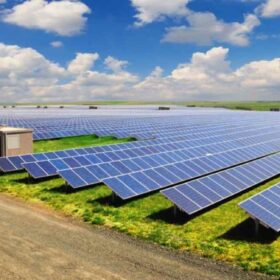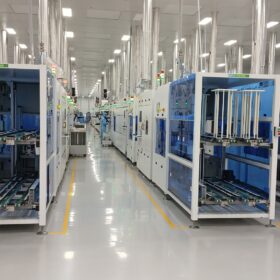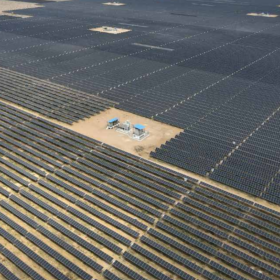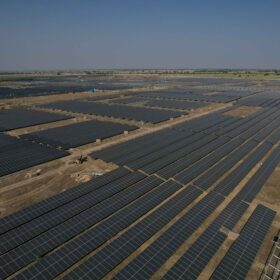When the UK police visited an address in Staffordshire they suspected of harboring solar panels stolen from a Worcestershire site in 2019, they not only recovered 13 modules but also found paperwork indicating planned shipments to Madrid for resale. The international disposal route linked to the raid – on a solar farm owned by water company Severn Trent, near Kidderminster, in the west of England – indicated organized crime involvement.
Police in the UK observed a 93% rise in reports of solar-related crimes from 2021 to 2022. That figure – reported by Detective Superintendent James Taylor, head of UK serious organized acquisitive crime unit Opal – included a rise in small-scale thefts of solar panels as rising energy bills and the cost-of-living crisis bite.
And the UK experience is far from unique. German solar security business Viamon tells pv magazine that more than 5,000 “major” solar thefts annually occur in Europe, with more than 400 in Germany alone. In southern Italy, says Viamon Managing Director Oliver Strecke, the solar crime rate is 10 times higher than the European average.
Cable theft
Taylor, presenting at a Solar Crime Open Day event organized by site security company DeterTech and London-based asset manager Schroders, reported a 48% rise in cabling and solar panel theft from solar sites between 2021 and 2022.
Speakers at the event, held in Telford, in the west of England, appealed for solar site owners to report all incidents of criminal damage, no matter how small. Taylor said GBP 574,300 ($691,500) worth of property was reported stolen from UK solar sites last year, but noted that the real figure is likely higher.
Strecke says European solar thefts typically cause €60,000 ($63,900) of damage, when repairs and loss of business are factored in.
“Solar crime is on the increase,” says Rachael Oakley, director of crime intelligence at Telford-based DeterTech, formally known as SmartWater Group thanks to its product-marking technology. “The cables are usually copper and are targeted for scrap value. The price of copper is rising again, which makes it more attractive to criminals. Criminals are starting to observe solar farms and they know there’s copper in the cabling, and solar panels there.”
Copper prices
Copper hit a record GBP 7,500 per ton in February, according to Richie Iwanoff, head of telecommunications company British Telecom’s acquisitive crime team. The price is expected to top GBP 10,000 per ton within a year, he said at the Telford event. Cable theft is big business in Europe too, with Strecke reporting that organized gangs can strip more than 30 km of copper during a five-hour nighttime raid.
“We have had cases where nine complete transformer stations were dismantled and the copper removed,” he says.
Oakley tells pv magazine that organized criminal groups plan their crimes like a business. “They have a very clear idea of what they’re going to steal, they will often have a ‘recce’ [reconnaissance visit] to see points of entry, they’ll know what tools they are going to use, and how they’re going to enter and exit the site in a hurry. They’ll also have a disposal route planned.”
Viamon’s Strecke says organized raiders typically remove 100 panels to 300 solar panels – 10 tons’ worth at the top end. In one case, he adds, thieves removed more than 15,000 panels – 5 MW of generation capacity – in one weekend. “It is organized crime, with big logistics in the background,” he says.
Oakley says criminals are selling cables on through scrap metal dealers. “Others are granulating it down,” she adds, in reference to the stripping of sheathing material to reach the copper. Taylor said UK thieves have used on-site granulating equipment.
Reporting incidents
Trade body Solar Energy UK confirms the picture and Taylor and Oakley emphasized the need for site operators to report even trivial incidents to help police build a bigger picture of solar crime. Minor wire cutting could indicate a criminal recce. “Small, low-level criminal damage needs to be reported,” said Taylor. “We know 61% of victims of solar energy [crime] are then repeat victims, either themselves or there’s a site within five miles attacked.” Former West Mercia Police intelligence analyst Oakley told the Telford event that “nothing is too small.”
The UK police are investigating copper disposal routes, and the We Don’t Buy Crime initiative by the West Mercia force, in the English West Midlands, features a traffic light system rating scrap metal dealers green, amber, or red based on their likelihood of receiving stolen goods, according to police intelligence. “The regulation of those is something that UK policing is trying to come to terms with, and struggling with, through Home Office regulation,” says Taylor.
Wider distribution routes are a tougher nut to crack, with Strecke’s company having used the sensors it fits to solar project equipment to track gear stolen from the UK county of Northamptonshire as far as Nigeria, two months later. “This is an international business and many traces lead to Eastern European gangs,” he adds.
Small scale
The rise of organized crime raids has been accompanied by more opportunistic thefts in the UK, of panels for resale.
“The cost-of-living crisis has worsened matters and there has been a big rise in rural crime,” says Oakley, of Freshstream Investment Partners-owned DeterTech. “Historically, criminals targeting solar farms have been organized. However, more recently we’ve been getting more information that local offenders have been chancing their arm at it as well.
“What we are seeing now is more opportunistic thieves chancing their luck. Thieves like that are more likely to dispose of goods through a local scrap yard, especially cable. Dealers shouldn’t sell anything without any paperwork but not every yard follows that requirement.
“We know there are solar panels also turning up on online marketplaces. We’re trying to educate the general market about buying second-hand panels online. The message is don’t buy something if you don’t know where it’s come from because, more often than not, that means it could have been stolen.”
Social media
“We know some of the stolen property, stolen panels, are also being sold rather brashly and brazenly on social media,” said Taylor. “When you consider there are 1.4 million solar panels in a domestic setting in the UK, and that’s expected to quadruple over the next two or three years, the demand and supply of those stolen panels is likely to increase as well.”
Given the UK’s economic outlook, he said that this type of criminality is either here to stay, or likely to be so. “When you consider the rural locations of some of the solar farms, it’s a high-reward, relatively low-risk crime,” he added.
Attendees at Telford heard the counties of Herefordshire and Worcestershire, in the West Midlands, are the UK’s solar crime hotspot, followed by Nottinghamshire, Cambridgeshire, and Kent.
None of the three police forces concerned would release statistics to pv magazine without a freedom-of-information request.
This content is protected by copyright and may not be reused. If you want to cooperate with us and would like to reuse some of our content, please contact: editors@pv-magazine.com.









By submitting this form you agree to pv magazine using your data for the purposes of publishing your comment.
Your personal data will only be disclosed or otherwise transmitted to third parties for the purposes of spam filtering or if this is necessary for technical maintenance of the website. Any other transfer to third parties will not take place unless this is justified on the basis of applicable data protection regulations or if pv magazine is legally obliged to do so.
You may revoke this consent at any time with effect for the future, in which case your personal data will be deleted immediately. Otherwise, your data will be deleted if pv magazine has processed your request or the purpose of data storage is fulfilled.
Further information on data privacy can be found in our Data Protection Policy.